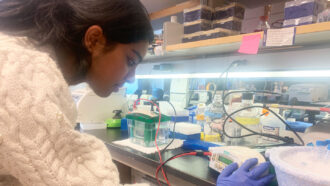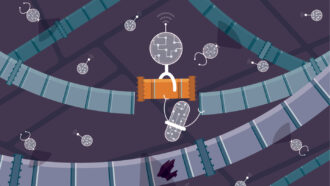Humans
-
 Health & Medicine
Health & MedicineHealth problems persist in Flint 10 years after water poisoning
Flint, Mich., residents still show health impacts long after a switch in their drinking-water source exposed them to toxic lead and other pollutants.
-
 Health & Medicine
Health & MedicineFamily, friends and community inspired these high school scientists
When looking for research ideas, listen to the people around you. What problems are they facing? What could you do to help?
-
 Health & Medicine
Health & MedicineThe teen brain is especially vulnerable to the harms of cannabis
Today’s concentrated cannabis products — with higher THC levels — may pose greater risks of addiction and psychosis than ever before.
-
 Science & Society
Science & SocietyMusic has the power to move us physically and emotionally. Here’s why
The way music impacts the brain can improve mood and overall health.
-
 Physics
PhysicsNeutrons are unveiling hidden secrets of fossils and artifacts
Images made with these particles have revealed details of dinosaur bones, mummies and more.
-
 Archaeology
ArchaeologyIron Age grave in England points to a possible woman warrior
The grave holds a sword. It hints the buried woman fought or helped plan raids some 2,000 years ago in what’s now southwest England.
By Bruce Bower -
 Tech
TechSynthetic biology aims to tackle disease and give cells superpowers
DNA machines and protein-mimicking nanotech could replace broken machinery in cells or even lead to made-from-scratch synthetic life.
-
 Science & Society
Science & SocietyTeen mental health: What role does social media play?
The Surgeon General advises that because social media is being linked to both good and harm, teens can use it — but should do so very carefully.
By Erin Ross -
 Health & Medicine
Health & MedicineSad or stressed? Here’s where to find health-ful info
The internet and hotlines have a lot of great resources — if you know where to find them and how to avoid the misinformation.
By Erin Ross -
 Humans
HumansSeven steps to boost your mood
Give yourself some quality “me time” every day. The goal is self-care and expression that can liberate you — and maybe even bring joy.
By Erin Ross -
 Humans
HumansBeing a teen has always been hard; now it’s especially so
More U.S. children and teenagers are reporting mental illness than ever. With not enough doctors to treat all of them, here’s how to find help.
By Erin Ross -
 Health & Medicine
Health & MedicineScientists Say: Calorie
These little units help us measure energy transfer in chemistry, nutrition and beyond.